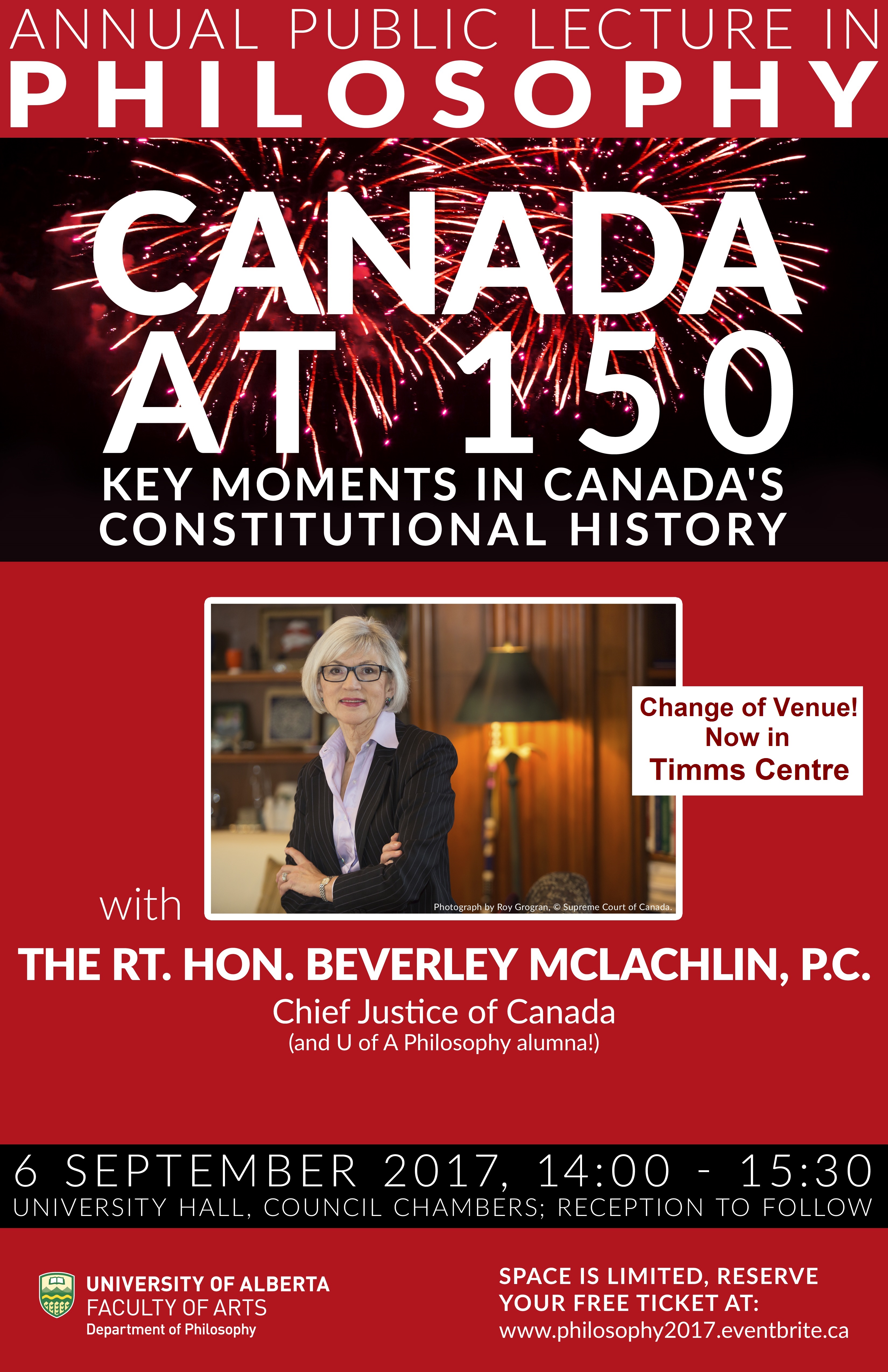
The Right Honourable Beverley McLachlin to speak at the Annual Public Lecture in Philosophy
The University of Alberta welcomes to campus a celebrated scholar, the Right Honourable Beverley McLachlin, Chief Justice of the Supreme Court of Canada. The first female chief justice of a Commonwealth nation and the longest serving Chief of the Supreme Court, she is also a graduate of the Faculty of Arts'philosophy program and is considered to be one of the most transformative leaders of her generation.
Chief Justice McLachlin, who hails from Pincher Creek, Alberta, will be speaking at theAnnual Public Lecture in Philosophy - Canada at 150: Key Moments in Canada's Constitutional History on Wednesday, September 6 at the Timms Centre for the Arts.
Jack Zupko, Chair of the Department of Philosophy, calls McLachlin "the most distinguished graduate of the philosophy program," adding that her master's thesis, rather fittingly, was entitled, The Role of Rules in the Concept of Law.
On January 7, 2000 - 18 years after Prime Minister Pierre Trudeausigned the Canadian Charter of Rights and Freedoms - McLachlin was appointed Chief Justice of the Supreme Court of Canada. Tasked with the interpretation and enforcement of the charter, McLachlin says she believes the court "belongs to the Canadian people and should reflect the Canadian people."
A defining principle of her legal and judicial career has been "conscious objectivity," or the act of empathy and imagination, which she says "recognizes the legitimacy of diverse experiences and viewpoints" - a critical element of judicial impartiality.
"My job is simply to listen to what the parties have to say, and to do my best to understand the position, the ramifications of deciding one way or the other, to think about what's best for Canadian society on this particular problem that's before us, and give it my best judgment after listening to, also, my eight other colleagues."*
During her tenure, McLachlin has played a seminal role in the advancement of human rights for all Canadians, including women, children, Indigenous and LGBTQ peoples. In terms of social policy, the Mclachlin-led court has ruled on a number of key societal game-changers, such as supervised injection drug clinics, freedom of expression, doctor-assisted suicide and the decriminalization of prostitution.
In another, perhaps less well-known, role, McLachlin serves as the Deputy of the Governor General of Canada. It was in fulfilling this role - acting on behalf of a convalescing Governor General Adrienne Clarkson - that McLachlin gave royal assent to the Civil Marriage Act, effectively legalizing same-sex marriage in Canada. More recently, in 2014, McLachlin rejected the Harper government's bid to have former child soldier and Guantanamo prisoner Omar Khadr declared an adult offender and confirmed the earlier order of the Alberta Court of Appeal that Khadr's sentence should be served in a provincial facility, paving the way to his subsequent release on bail.
Anoft-quoted anecdote about the chief justice is that she had not considered a career in law until she was persuaded by her first husband, Rory McLachlin, and by a professor "that a tough-minded woman could break through the institutional barriers of the predominantly male legal profession."
This proved not only to be prophetic, but wildly understated. After completing her master's degree in philosophy as well as a law degree, both in 1968, McLachlin's rise through the legal ranks was swift. In 1981, she was appointed to the B.C. Supreme Court and in 1985, to the B.C. Court of Appeal. In 1988, she became Chief Justice of British Columbia. In 1989, at 45, Prime Minister Jean Chrétien nominated McLachlin to the Supreme Court of Canada, and in 2000, she was appointed 17th Chief Justice of Canada.
McLachlin has received many honorary doctorates (nearly 30!), including one from the University of Alberta in 1991. In 1994, she was awarded the university's Distinguished Alumni Award.
In June 2017, Chief Justice McLachlin announced her intention to retire from the bench on December 15, 2017, nine months before she reaches the mandatory retirement age of 75. Following the announcement, Prime Minister Justin Trudeau described her judicial accomplishments as "unparalleled" in Canadian history.
"Canadians," he said, "owe her an immense debt."
The Department of Philosophy'sAnnual Public Lecture, Canada at 150 Key Moments in Canada's Constitutional History, with the Rt. Hon. Beverley McLachlin, P.C., Chief Justice of Canada, takes place on Wednesday, September 6 from 2 - 4:30 p.m. at the Timms Centre for the Arts. Reception to follow.
*Interview with Joseph Brean, National Post, May 23, 2015.
Banner/detail photo: Fred Chartrand, Toronto Star